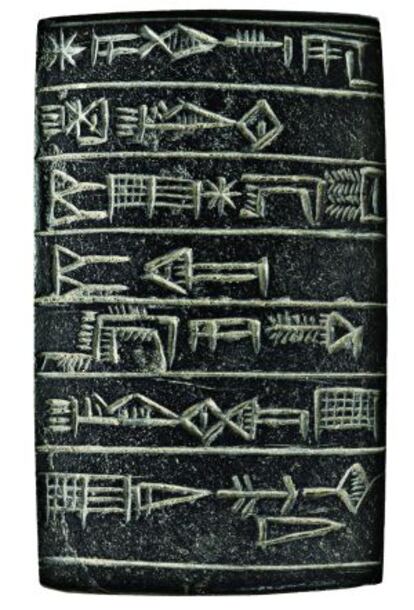Mesopotamia, the origin of the world as we know it
CaixaForum shows how civilization sprung from Sumeria


The Bible did not go wrong when it situated Eden and the origins of the world between the Tigris and Euphrates rivers, in a fertile area known as Mesopotamia - coinciding with the non-desert-like parts of today's Iraq and northwest Syria.
Archeology has proven that much of our modern culture was born in this privileged location nearly 6,000 years ago: cities, writing, royalty, accounting, division of labor, money, laws, literature, trade, monumental buildings, the wheel, the sexagesimal system we use to measure time, and a long list of other inventions that has made "civilized" beings out of humans.
There were still 2,500 years left before Europe was to erect its first megalithic monuments, and Egypt still lacked a unified state ruled by a pharaoh, but down in southern Iraq, in a place known as Sumeria, the first city in the history of the world was built: Uruk, an urban enclave with streets and canals that was home to between 35,000 and 80,000 people. Antes del diluvio. Mesopotamia, 3500-2100 A.C. (or, Before the Flood: Mesopotamia 3,500-2,100 BC) brings together 400 artifacts at CaixaForum Barcelona until February 24. Most are everyday objects that our modern gaze has turned into works of art. Thirty-two museums and private collections have loaned pieces for the show, including the Louvre in Paris, the Field Museum in Chicago and New York's Metropolitan.
There are also 3D reconstructions of buildings from the city of Ur and the White Temple of Uruk, created specifically for the show, as well as photographs by contemporary artists, reflecting the fascination that this part of the Middle East continues to hold for Western culture.
This is the most comprehensive vision ever of the cultures of southern Mesopotamia"
There is one exhibit that forces visitors to walk around it and observe the items within. "Like the Sumerian heroes' journeys of initiation, which were filled with obstacles, we created a white desert of sorts in which the pieces are buried," explains curator Pedro Azara. "This is the most comprehensive vision ever of the cultures of southern Mesopotamia."
For five years, this scholar gathered the material for the show, mostly objects made of humble elements such as clay. There are tablets inscribed with cuneiform characters, which were found to list heads of cattle and grain for the temples; there are also lists of kings, hymns to the gods, mythological tales, and even city maps and building sketches. All of this remained behind thanks to the fact that the clay cooked when the buildings that contained them burnt down.
The exhibition explains how the West came to know about Mesopotamia, from the early reports by chroniclers under the Córdoba Caliphate, in the 10th century, to the first expeditions of the 1920s, when the area came under British rule.
Antes del diluvio . Until February 24 at CaixaForum Barcelona, Av. de Francesc Ferrer i Guàrdia, 6-8, Barcelona. obrasocial.lacaixa.es
Tu suscripción se está usando en otro dispositivo
¿Quieres añadir otro usuario a tu suscripción?
Si continúas leyendo en este dispositivo, no se podrá leer en el otro.
FlechaTu suscripción se está usando en otro dispositivo y solo puedes acceder a EL PAÍS desde un dispositivo a la vez.
Si quieres compartir tu cuenta, cambia tu suscripción a la modalidad Premium, así podrás añadir otro usuario. Cada uno accederá con su propia cuenta de email, lo que os permitirá personalizar vuestra experiencia en EL PAÍS.
¿Tienes una suscripción de empresa? Accede aquí para contratar más cuentas.
En el caso de no saber quién está usando tu cuenta, te recomendamos cambiar tu contraseña aquí.
Si decides continuar compartiendo tu cuenta, este mensaje se mostrará en tu dispositivo y en el de la otra persona que está usando tu cuenta de forma indefinida, afectando a tu experiencia de lectura. Puedes consultar aquí los términos y condiciones de la suscripción digital.








































